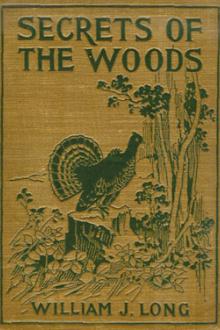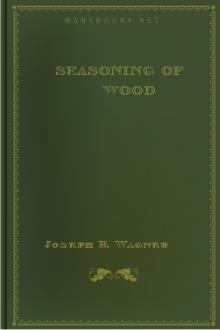Secret of the Woods - William J. Long (e reader for manga .txt) 📗

- Author: William J. Long
- Performer: -
Book online «Secret of the Woods - William J. Long (e reader for manga .txt) 📗». Author William J. Long
WILLIAM J. LONG
Wood Folk Series Book Three
1901
TO CH’GEEGEE-LOKH-SIS, “Little
Friend Ch’geegee,” whose
coming makes the winter glad.
PREFACEThis little book is but another chapter in the shy ‘wild life of the fields and woods’ of which “Ways of Wood Folk” and “Wilderness Ways ” were the beginning. It is given gladly in answer to the call for more from those who have read the previous volumes, and whose letters are full of the spirit of kindness and appreciation.
Many questions have come of late with these same letters; chief of which is this: How shall one discover such things for himself? how shall we, too, read the secrets of the Wood Folk?
There is no space here to answer, to describe the long training, even if one could explain perfectly what is more or less unconscious. I would only suggest that perhaps the real reason why we see so little in the woods is the way we go through them—talking, laughing, rustling, smashing twigs, disturbing the peace of the solitudes by what must seem strange and uncouth noises to the little wild creatures. They, on the other hand, slip with noiseless feet through their native coverts, shy, silent, listening, more concerned to hear than to be heard, loving the silence, hating noise and fearing it, as they fear and hate their natural enemies.
We would not feel comfortable if a big barbarian came into our quiet home, broke the door down, whacked his war-club on the furniture, and whooped his battle yell. We could hardly be natural under the circumstances. Our true dispositions would hide themselves. We might even vacate the house bodily. Just so Wood Folk. Only as you copy their ways can you expect to share their life and their secrets. And it is astonishing how little the shyest of them fears you, if you but keep silence and avoid all excitement, even of feeling; for they understand your feeling quite as much as your action.
A dog knows when you are afraid of him; when you are hostile; when friendly. So does a bear. Lose your nerve, and the horse you are riding goes to pieces instantly. Bubble over with suppressed excitement, and the deer yonder, stepping daintily down the bank to your canoe in the water grasses, will stamp and snort and bound away without ever knowing what startled him. But be quiet, friendly, peace-possessed in the same place, and the deer, even after discovering you, will draw near and show his curiosity in twenty pretty ways ere he trots away, looking back over his shoulder for your last message. Then be generous—show him the flash of a looking-glass, the flutter of a bright handkerchief, a tin whistle, or any other little kickshaw that the remembrance of a boy’s pocket may suggest—and the chances are that he will come back again, finding curiosity so richly rewarded.
That is another point to remember: all the Wood Folk are more curious about you than you are about them. Sit down quietly in the woods anywhere, and your coming will occasion the same stir that a stranger makes in a New England hill town. Control your curiosity, and soon their curiosity gets beyond control; they must come to find out who you are and what you are doing. Then you have the advantage; for, while their curiosity is being satisfied, they forget fear and show you many curious bits of their life that you will never discover otherwise.
As to the source of these sketches, it is the same as that of the others years of quiet observation in the woods and fields, and some old notebooks which hold the records of summer and winter camps in the great wilderness.
My kind publishers announced, some time ago, a table of contents, which included chapters on jay and fish-hawk, panther, and musquash, and a certain savage old bull moose that once took up his abode too near my camp for comfort. My only excuse for their non-appearance is that my little book was full before their turn came. They will find their place, I trust, in another volume presently.
STAMFORD, CONN., June, 1901.
Wm. J. LONG.
CONTENTS TOOKHEES THE ‘FRAID ONE A WILDERNESS BYWAY KEEONEKH THE FISHERMAN KOSKOMENOS THE OUTCAST MEEKO THE MISCHIEF-MAKERTHE OL’ BEECH PA’TRIDGE
FOLLOWING THE DEER SUMMER WOODS STILL HUNTING WINTER TRAILS SNOW BOUND GLOSSARY OF INDIAN NAMES SECRETS OF THE WOODS TOOKHEES THE ‘FRAID ONELittle Tookhees the wood mouse, the ‘Fraid One, as Simmo calls him, always makes two appearances when you squeak to bring him out. First, after much peeking, he runs out of his tunnel; sits up once on his hind legs; rubs his eyes with his paws; looks up for the owl, and behind him for the fox, and straight ahead at the tent where the man lives; then he dives back headlong into his tunnel with a rustle of leaves and a frightened whistle, as if Kupkawis the little owl had seen him. That is to reassure himself. In a moment he comes back softly to see what kind of crumbs you have given him.
No wonder Tookhees is so timid, for there is no place in earth or air or water, outside his own little doorway under the mossy stone, where he is safe. Above him the owls watch by night and the hawks by day; around him not a prowler of the wilderness, from Mooween the bear down through a score of gradations, to Kagax the bloodthirsty little weasel, but will sniff under every old log in the hope of finding a wood mouse; and if he takes a swim, as he is fond of doing, not a big trout in the river but leaves his eddy to rush at the tiny ripple holding bravely across the current. So, with all these enemies waiting to catch him the moment he ventures out, Tookhees must needs make one or two false starts in order to find out where the coast is clear.
That is why he always dodges back after his first appearance; why he gives you two or three swift glimpses of himself, now here, now there, before coming out into the light. He knows his enemies are so hungry, so afraid he will get away or that somebody else will catch him, that they jump for him the moment he shows a whisker. So eager are they for his flesh, and so sure, after missing him, that the swoop of wings or the snap of red jaws has scared him into permanent hiding, that they pass on to other trails. And when a prowler, watching from behind a stump, sees Tookhees flash out of sight and hears his startled squeak, he thinks naturally that the keen little eyes have seen the tail, which he forgot to curl close enough, and so sneaks away as if ashamed of himself. Not even the fox, whose patience is without end, has learned the wisdom of waiting for Tookhees’ second appearance. And that is the salvation of the little ‘Fraid One.
From all these enemies Tookhees has one refuge, the little arched nest beyond the pretty doorway under the mossy stone. Most of his enemies can dig, to be sure, but his tunnel winds about in such a way that they never can tell from the looks of his doorway where it leads to; and there are no snakes in the wilderness to follow and find out. Occasionally I have seen where Mooween the bear has turned the stone over and clawed the earth beneath; but there is generally a tough root in the way, and Mooween concludes that he is taking too much trouble for so small a mouthful, and shuffles off to the log where the red ants live.
On his journeys through the woods Tookhees never forgets the dangerous possibilities. His progress is a series of jerks, and whisks, and jumps, and hidings. He leaves his doorway, after much watching, and shoots like a minnow across the moss to an upturned root. There he sits up and listens, rubbing his whiskers nervously. Then he glides along the root for a couple of feet, drops to the ground and disappears. He is hiding there under a dead leaf. A moment of stillness and he jumps like a jack-in-abox. Now he is sitting on the leaf that covered him, rubbing his whiskers again, looking back over his trail as if he heard footsteps behind him. Then another nervous dash, a squeak which proclaims at once his escape. and his arrival, and he vanishes under the old moss-grown log where his fellows live, a whole colony of them.
All these things, and many more, I discovered the first season that I began to study the wild things that lived within sight of my tent. I had been making long excursions after bear and beaver, following on wild-goose chases after Old Whitehead the eagle and Kakagos the wild woods raven that always escaped me, only to find that within the warm circle of my camp-fire little wild folk were hiding whose lives were more unknown and quite as interesting as the greater creatures I had been following.
One day, as I returned quietly to camp, I saw Simmo quite lost in watching something near my tent. He stood beside a great birch tree, one hand resting against the bark that he would claim next winter for his new canoe; the other hand still grasped his axe, which he had picked up a moment before to quicken the tempo of the bean kettle’s song. His dark face peered behind the tree with a kind of childlike intensity written all over it.
I stole nearer without his hearing me; but I could see nothing.
The woods were all still. Killooleet was dozing by his nest; the chickadees had vanished, knowing that it was not meal time; and Meeko the red squirrel had been made to jump from the fir top to the ground so often that now he kept sullenly to his own hemlock across the island, nursing his sore feet and scolding like a fury whenever I approached. Still Simmo watched, as if a bear were approaching his bait, till I whispered, “Quiee, Simmo, what is it?”
“Nodwar k’chee Toquis, I see little ‘Fraid One’” he said, unconsciously dropping into his own dialect, which is the softest speech in the world, so soft that wild things are not disturbed when they hear it, thinking it only a louder sough of the pines or a softer tunking of ripples on the rocks.—“O bah cosh, see!
He wash-um face in yo lil cup.” And when I tiptoed to his side, there was Tookhees sitting on the rim of my drinking cup, in which I had left a new leader to soak for the evening’s fishing, scrubbing his face diligently, like a boy who is watched from behind to see that he slights not his ears or his neck.
Remembering my own boyhood on cold mornings, I looked behind him to see if he also were under compulsion, but there was no other mouse in sight. He would scoop up





Comments (0)